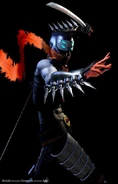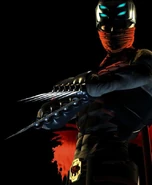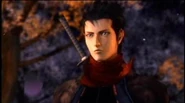
|

Hotsuma
Hotsuma is a player character in Sega's Shinobi series, appearing initially as the protagonist of the 2002 PlayStation 2 video game Shinobi and its comic book adaptation, and later as a secret character in 2003's Nightshade. Conceived by Noriyoshi Ohba, he is the leader of the Oboro ninja clan and is equipped with a sword named Akujiki that feeds on souls. His critical reception has been positive, often focusing on his style and movements.
Conception and characteristics
Hotsuma was conceived by prominent Sega employee Noriyoshi Ohba. His conception came as a result of a desire to create a "darker hero" and tone for Shinobi. He was given a bright red scarf so that the player could easily locate him—it was perceived that his fast movements made the game confusing—and to contrast with his back, which is all that is visible of him during the majority of the game. Producer Takashi Uriu aimed for the scarf to make Hotsuma recognizable by silhouette, as are iconic comic book characters Spawn and Batman. Due to the 3D rendering of Shinobi, developer Overworks decided to grant Hotsuma the ability to run on walls. His usage of ninja magic was a recurring feature in the series, implemented as part of a desire to mix older and newer gameplay elements. However, his "stealth dash" move was a new addition consistent with the overall fast-paced nature of the game. The move hatched from Uriu's knowledge of real life ninja's ability to "divide themselves into different bodies. Hotsuma is voiced by Jordan Rosa in English and Daisuke Kishio in Japanese.
Hotsuma is the owner of Akujiki, a sword that feeds on souls and is his weapon. Akujiki will begin feeding on Hotsuma's soul if he does not kill enemies efficiently enough, creating urgency in the hack and slash gameplay. However, killing several enemies quickly allows him to perform a powerful and exaggeratedly violent "TATE" attack. Hotsuma can also throw shurikens.
Appearances
Hotsuma is the protagonist of Shinobi. He is the leader of the Oboro ninja clan, a position he inherited by killing his brother Moritsune in a duel. While he is content with his position in the clan, the death of his brother sporadically haunts him. After an earthquake in his hometown Tokyo levels the city and causes a golden castle to appear, the sorcerer Hiruko Ubusuna appears and instructs summoned hellspawn to destroy the city. Hotsuma makes it a quest to investigate the palace and make peace with his past. This involves investigating eight levels, each with its own boss. The seventh boss is an apparently revitalized Moritsune. Hotsuma fights Hiruko as the eighth boss at the end of the game. Upon Hiruko's defeat, his soul is absorbed into Akujiki, he dies, and the castle collapses.
Hotsuma appears as a secret character in Shinobi's 2003 sequel Nightshade, also exclusive to the PlayStation 2. He is unlockable after the player completes the game.
A single-issue comic book adaptation of Shinobi created by Scott Allie, published by Dark Horse Comics, and released in 2002, stars Hotsuma.
Critical reception
Hotsuma's critical reception has been positive, often focusing on his style and movements. IGN journalist David Smith called Hotsuma "a great design, a sort of post-modern evolution of the ninja in comparison to the thoroughly traditional Joe Musashi the main protagonist of the series", additionally commending the coordination of his moves with his appearance. A review from 1UP.com stated that he is "the supermodel of video-game action heroes—lean, stylish and mean—and he fights as good as he looks." GameSpy's Benjamin Turner and Allgame's Brett Alan Weiss described him as "sleek". Weiss offered strong praise for Akujiki, GameSpot's Justin Calvert noted that "unlike most ninjas that appear in games, Hotsuma shuns shadows and the art of stealth in favor of chopping up enemies with his cursed ninja sword and a handful of throwing knives." Upon Nightshade's release, GameSpot writer Greg Kasavin compared Hotsuma to protagonist Hibana, remarking upon their similar appearances and attacks, and criticizing Hotsuma's need to "constantly feed his sword with enemies' souls lest he run out of power."
Gallery
External links
- Hotsuma (video game character) at GiantBomb



